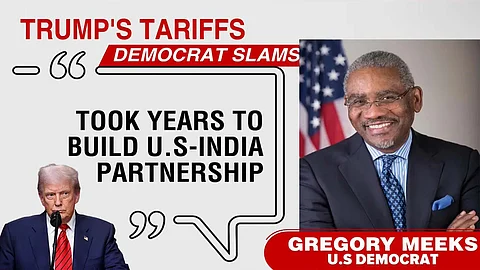

New York | US President Donald Trump's latest “tariff tantrum" risks years of careful work to build a stronger US-India partnership, a prominent American Congressman has said.
Representative Gregory Meeks, a Democrat and Ranking Member of the House Foreign Affairs Committee Dems, on Thursday said that the US has “deep strategic, economic, and people-to-people ties” with India.
“Trump's latest tariff tantrum risks years of careful work to build a stronger US-India partnership,” Meeks said in a post on X.
“Concerns should be addressed in a mutually respectful way consistent with our democratic values,” he added.
Last week, Trump had announced 25 per cent reciprocal tariffs on India that came into effect from August 7.
The US president on Wednesday also signed an executive order slapping an additional 25 per cent levy on India for New Delhi's purchases of Russian oil, bringing the total duties to 50 per cent, among the highest imposed by the US on any country in the world.
The additional 25 per cent duty will come into effect after 21 days or August 27.
Meanwhile, New York-based Indian-American entrepreneur and geopolitical expert Al Mason told PTI that Trump and Prime Minister Narendra Modi are seasoned politicians and master tacticians and have cultivated a friendship that goes beyond ceremonial diplomacy.
“It is not just handshakes and photo ops — it is a convergence of mindsets. Both understand that leadership is not about avoiding conflict, but about navigating it with clarity and purpose,” Mason said.
He added that in the “theatre of global politics, genuine relationships between world leaders are often the quiet force behind historic decisions”.
“These bonds, forged over time, are not immune to friction — but they endure because they are built on mutual respect and a shared desire to serve their nations.,” Mason said, and added that Trump and Modi “are two such leaders”.
Mason stressed that the US and India cannot afford to sideline each other's political perspectives.
“Their strategic interests are deeply intertwined, and their partnership is not a matter of convenience; it is a geopolitical necessity. In an increasingly polarised world, the strength of their alliance will shape not only bilateral outcomes but the global democratic narrative,” he said.
